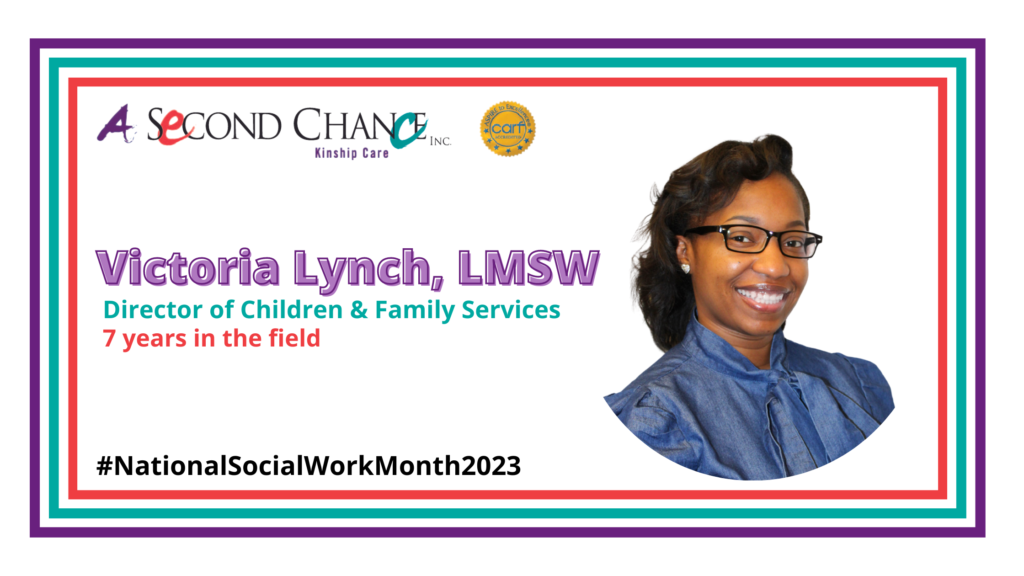Blog
#SocialWorkSuperhero Victoria Lynch

ASCI: What challenges and benefits have you experienced as a child welfare caseworker?
Victoria Lynch: One challenge that I have seen is that everyone working in the child welfare realm does not share the same values and unfortunately, this presents itself in many ways such as delays in service, lack of follow through, subpar professional decorum, etc. A benefit of working in child welfare is that I am part of the work done to ensure child safety in addition to assessing for other needs of the family.
ASCI: How have you seen kinship care practice evolve since you began in social work?
VL: Within the past five years the term kinship has become more familiar in conversations with my peers. I think people are now familiar with fictive kin as well as biological kin. Family and friends assisting with raising children is not new, but there is more data surrounding the benefits of kinship care.
ASCI: Did you learn about kinship care in your social work studies? If so, what information did you find most helpful to prepare you for working in this specific field? If not, what would have been helpful to learn to prepare you?
VL: I had one course that briefly touched on traditional foster care and barely mentioned kinship care. I attended a school in New York with people from across the nation, so it was interesting to hear what the various values and focuses are in different locations. I think it would have been helpful if the benefits of kinship care were discussed so that students could advocate for it in their regions.
ASCI: What has kept you working in this field?
VL: I’ve always loved children, but I believe I’ve remained in this field due to my love of family and togetherness.
ASCI: What made you choose to practice casework/social in kinship care?
VL: As I awaited acceptance into a med school, I was ready for a change in employment and a friend suggested A Second Chance, Inc. I applied to ASCI where I quickly realized human services also fulfilled my purpose of helping people, so I switched my career path and remained in this field.
ASCI: How do you keep yourself from getting burned out?
VL: As a former child in the foster care system, I remember what it was like for me and each day I strive to be the person I wish I had when I was younger. Someone who keeps their word and shows up!
ASCI: Can you recall any specific cases that were particularly fulfilling for you?
VL: I had a case with an infant baby who was removed from his mom’s care and placed with grandma because mom didn’t have a job and was unable to keep her utilities on. After speaking with mom, she reported having some postpartum depression and struggled with being able to afford childcare causing her to lose her job and health insurance. In this case, we assisted her with becoming involved in mental health services, securing a new job, and subsidized childcare so the pair could be reunified. She still reaches out to me to check in around holidays and it’s wonderful knowing they are doing well. Unfortunately, there are many families disrupted when children don’t necessarily need to be removed but could have services and resources implemented instead. Advocacy is a huge part of my role!
ASCI: Have you ever found it difficult to perform your job while adhering to policy/government mandates?
VL: I would not say difficult, but the pandemic presented some challenges that required us to think out of the box to resolve.
ASCI: What skills should students of social work focus on developing? How would these skills help them excel as social workers?
VL: Having the ability to think critically is a skill needed in social work because every situation is different. In social work, there are diverse situations and many layers, so it is imperative that a person have the ability to take a deeper dive into information and ask probing questions to ensure effective service delivery.
ASCI: What do you wish someone would have told you when you first entered social work?
VL: Social work is very emotional. At times you will be overcome with thoughts and feelings which is natural, however we must be able to separate the personal from the professional. It’s ok to show emotion because we are human, but if your emotions begin to disrupt your judgment and reasoning, it may be early signs of burnout. Talk to someone and understand that it’s ok to ask for help.
ASCI: What words of wisdom would you give the next generation of social workers?
VL: You never know what a person is battling so meet them where they are. We all have a story so be kind always!
ASCI: What ways can/should employers support social workers?
VL: I think that employers should be transparent about both the good and not so good aspects of their role. I also believe that having leaders with an open door policy is helpful because we cannot predict when someone will need to talk, strategize, or vent. Lastly, I feel that promoting a healthy work-life balance is important so that individuals do not feel as if they are in constant crisis because vicarious trauma impacts people differently.